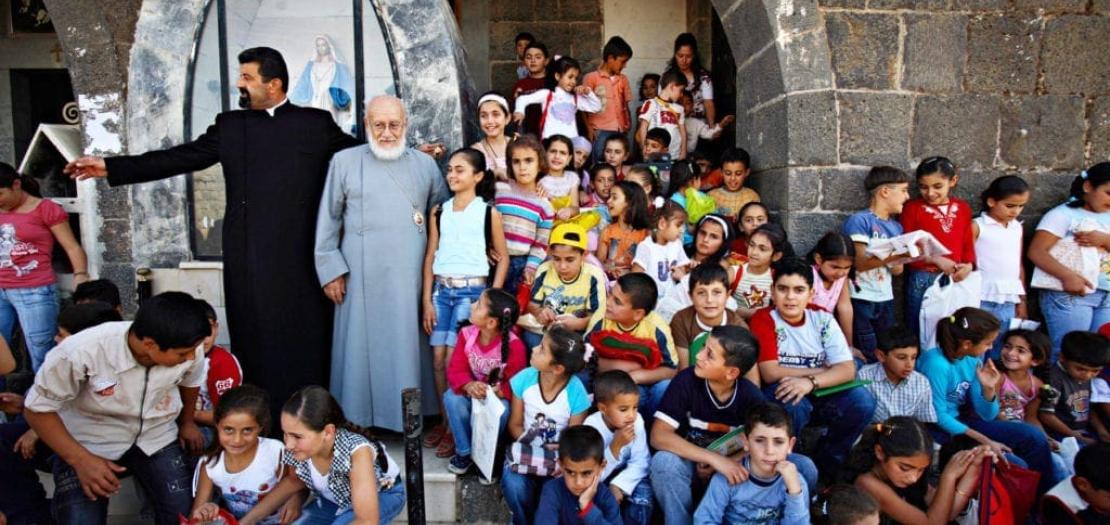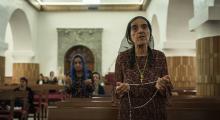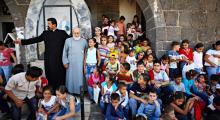Issued by the Catholic Center for Studies and Media - Jordan. Editor-in-chief Fr. Rif'at Bader - موقع أبونا abouna.org

Humanitarian aid and pastoral support continue to reach Christian communities in Syria, despite the recent upheaval in the country, said Michel Constantin, regional director for CNEWA-Pontifical Mission for Lebanon, Syria and Egypt.
In a status report dated 10 December, Mr. Constantin said his team communicated with partners in the local church, who “have all confirmed that the situation remains stable with the rebels.”
The Christian community in Syria initially reacted to the fall of the regime of Bashar al Assad on 8 December with mixed feelings, but is now hopeful the situation will improve, said Mr. Constantin.
He said church officials were “assured … that the new authority on the ground will be committed to providing all protection to all citizens, and especially the Christians,” who have communities in the majority of Syria’s large urban centers.
Church officials were also told “the current chaotic acts will be controlled soon to prevent the thieves and gangs from benefitting from the situation,” he reported.
Syria’s three patriarchs spoke out about the situation, issuing a call to “unify efforts” and “stand by their people.”
Patriarchs John X of Antioch and All the East, Aphrem II Karim of the Syriac Orthodox Church, and Joseph Absi of the Melkite Greek Catholic Church highlighted “the importance of preserving the Christian presence and upholding the values of citizenship and coexistence,” according to a report in The Orthodox Times on 11 December.
Mr. Constantin described the “new status quo” in Syria since the fall of the Assad regime as “a fragile balance” among three groups. These include the rebels, who control about 65 per cent of the Syrian territory, including major cities, the Kurds, who control about 30 percent of Syrian territory in the northern and eastern regions, and another rebel group along the southern border, where the Druze minority lives, which Israel crossed earlier this week to create a nine-mile buffer zone along the border.
“The real challenge now is to really follow the peace process” and the successful implementation of a transitional government, said Mr. Constantin.
On 10 December, the Islamist militant group Hayat Tahrir Al-Sham (HTS) appointed a new prime minister, Mohammed al Bashir, to head the Syrian Transitional Government.
The appointment made without consultation of the national council “could be a sign of a new direction in Syria based on a new military control of the political authority,” said Mr. Constantin, underlining the role of the international community in placing “more pressures” for a peaceful transition. The militant group “has never hidden its religious affiliation and its political roots” as a branch of Al Qaeda, he added.
“This political process will eventually lead to changing the constitution to build a new democratic regime on the one hand and preserving the minorities’ rights on the other hand,” he said.
Citizens are waiting to see whether power in the country will be shared “with all political, national and religious fragments of the Syrian society,” he added.
In the meantime, the dramatic devaluation of the Syrian pound has plunged vulnerable Syrians further into poverty. The change in currency to the Turkish Lira or U.S. dollar has caused a spike in the cost of living, and an increasing number of families need emergency items like food, medicine, fuel for cooking and heating, diapers and infant formula. Most markets remain closed in all cities except Aleppo.
“We are in an observation phase,” said Mr. Constantin. “We need to wait and to see how the developments will shape the fate of the new Syria.”







